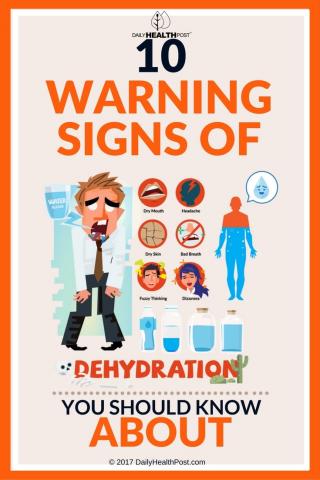
Thirst may be annoying at times, but water dehydration should never go ignored. Water actually makes up over two-thirds of the healthy human body. Most people are not aware how bad water dehydration can affect you. Water is an essential part of the body. It lubricates the joints and eyes, aids digestion, flushes out waste and toxins, and keeps the skin healthy.
That’s why you should always make sure to drink water throughout the day and before and after meals. Many people don’t realize how much water they lose every day and end up chronically dehydrated. Diabetics, burn victims and athletes are at a higher risk of dehydration than the average person. Are you suffering from water dehydration?
Here’s a list of 10 warning signs of water dehydration that you should pay attention to:
1. Heart Palpitations - When the normal water content of your body is reduced, it upsets the balance of minerals (salts and sugar) in your body, which affects the way it functions. Heart palpitations typically occur when there is low potassium and low sugar levels in the blood. This can cause from premature contractions of the heart’s upper chambers (atria) or the lower chambers (ventricles). Low magnesium (through excessive sweating or diarrhea) may also lead to abnormal heart rhythm.
2. Bad Breath- Saliva protects your teeth from decay, disease and cavities by forming a protective barrier around them and helping clear food particles on and between your teeth. When you become dehydrated, you do not produce as much saliva. The reduced cleaning action of the saliva allows bacteria to grow, causing bad breath. Dry mouth also makes you more likely to develop rapid tooth decay and gum (periodontal) disease.
3. Food Cravings - “While you can crave anything from chocolate to a salty snack, cravings for sweets are more common because your body may be experiencing difficulty with glycogen production”. Instead of junk food, reach for water-dense foods, try fruits like watermelon, kiwi and peaches. You may also find that vegetables like cucumber and tomatoes also satisfy your craving. Fruits and vegetables can help prevent water dehydration and also if you don’t like drinking water that much.
4. Painful Joints and Muscles - The cartilage in your joints is made up of roughly 65 to 80% water. When the joints aren’t properly hydrated, it can cause the bones they connect to grind. This causes pain and inflammation. Low magnesium from dehydration can also cause muscle cramps and pain in the leg muscles. Eat dark leafy greens and avocado to replenish both your water and mineral levels.
5. Headaches - The brain sits inside a fluid sack that keeps it from bumping against the skull. This ensures that your brain isn’t damaged every time you walk or run. If the fluid in this sack is reduced, your brain can begin to push against your skull. This is one of the most common causes of headaches. Water dehydration also decreases blood supply to the brain, meaning less oxygen and glucose, which can also trigger a headache. Before you decide to take Advil to relieve a headache, try drinking some water beforehand.
6. Constipation and Poor Digestion - Water helps the body break down food so that your body can better absorb nutrients. In particular, it boosts the absorption of water-soluble vitamins, like vitamin C. The large intestine soaks up water from your food waste to be processed by your kidneys.
7. Fatigue and Lethargy - Fluid loss causes your blood volume to drop and your blood pressure to rise. Your heart has to expand more energy to feed your brain, skin, and muscles with oxygen and nutrients. This can leave your feeling tired and sleepy. In one study, women who weren’t sufficiently hydrated after exercise scored lower on questionnaires assessing mood. They also found it harder to work and experienced more fatigue and confusion than when they were properly hydrated. Men had similar results.
8. Dark Urine -The kidneys work to maintain fluid balance within your body. When you drink enough water, your urine should be light to clear yellow. This means that your kidneys have enough water to expel toxins from your body. When your urine is dark, it means that your kidney redirected water back into your body to maintain blood pressure and mineral balance. Dark urine has a large concentration of toxins and should be taken as an urgent sign to drink more water. Chronic dehydration can leave your kidneys overloaded with toxins, causing kidney stones.
9. Dry Skin and Lips - Your skin is made up of about 30% water, which contributes to plumpness, elasticity, and resiliency. The oil that your skin produces prevents water from evaporating. However, factors like showering habits, dry air, heat and skin infection can lead to high rates of water evaporation, leaving your skin dry and itchy. Skin cells are also the first to lose their fluid content during internal dehydration. This is done to favor fluid retention in the internal organs. Drinking enough water everyday will help prevent this phenomenon and skin thickness and density.
10. Brain Fog - Water, or lack thereof, can produce changes in mood and cognitive functioning. Mild dehydration can diminish short-term memory, perceptual discrimination, arithmetic ability, vasomotor tracking, and psychomotor skill in people of all ages. It can also cause mood swings between exhaustion, confusion, anger and high energy.